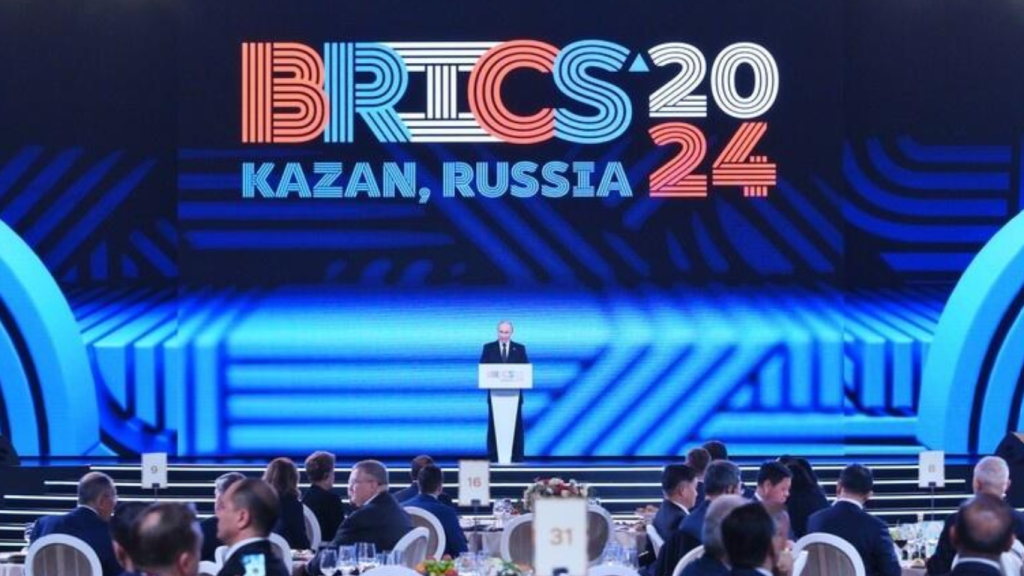The Kazan Declaration marks a significant moment in the evolution of the BRICS group, reflecting its expanded composition and readiness to embark on a new chapter in its history. Unlike previous summits, which produced shorter statements, this declaration comprises an extensive 134 paragraphs that articulate a unified vision for the BRICS nations regarding contemporary global challenges. This comprehensive document is likely to generate considerable discussion and analysis within political and academic spheres, while simultaneously inviting criticism from detractors of the BRICS coalition. For the first time, it meticulously outlines the group’s assessment of the current international landscape, offering a clearer set of shared approaches to critical global issues and regional crises.
The structure of the Kazan Declaration is thoughtfully organized into a preamble and four sections focused on strengthening multilateralism, ensuring global and regional security, promoting financial and economic cooperation, and fostering humanitarian exchanges. This organization aligns with the strategic priorities set forth during Russia’s chairmanship of BRICS and signifies an increasingly detailed framework for the group’s multilateral cooperation. In recent years, the outcomes from BRICS summits have progressively expanded in scope and substance, suggesting a maturing of the group’s collaborative efforts to address varied international challenges. Although the Declaration does not specify timelines or roadmaps for its proposed actions, it identifies critical objectives that members may pursue in the coming years, demonstrating deep preparatory work leading up to this summit.
One notable feature of the Kazan Declaration is its balanced treatment of security and development issues. This dual focus indicates a deliberate decision to maintain BRICS’s broad mandate, eschewing a narrow approach that could limit its potential impact. By positioning itself as a multifaceted laboratory for global governance, BRICS aims to test innovative models for addressing global economic and political challenges; this includes fostering new approaches to trade, finance, and strategic stability. The group’s diverse agenda enhances the likelihood of success for various initiatives, as the collaboration is structured to be more adaptable and less bureaucratic than traditional international organizations.
The Declaration also touches on the complex landscape of international finance and development, where BRICS faces the challenge of either reforming existing institutions leaning towards Western models or creating alternatives. The document expresses aspirations for fundamental changes within established structures such as the IMF, while also advocating for the promotion of non-Western alternatives, like the New Development Bank (NDB) and the BRICS Contingent Reserve Arrangement (CRA). It underlines the significance of the World Trade Organization (WTO) while also emphasizing the need for greater trade liberalization among BRICS members. Notably, the Declaration critiques “unlawful unilateral coercive measures,” including sanctions that damage the global economy, a particularly resonant point for many BRICS nations that endure such measures.
When it comes to security concerns, the Declaration reveals the sensitivity surrounding this agenda, with careful language used to broach delicate topics. Members of BRICS often hold divergent positions on various conflicts, making consensus difficult. Noteworthy is the succinct treatment of the Ukraine conflict, which references existing positions found in UN votes. The Declaration aims for diplomatic solutions consistent with UN principles, honoring mediation efforts while promoting dialogue. Additionally, it navigates potential discord between members by providing general statements, such as those addressing the territorial integrity of Syria and the crisis in Gaza, which reveal underlying tensions without invoking direct confrontation.
The Kazan Declaration foreshadows that the enlarged BRICS coalition is embarking on an innovative path in international governance. It is crucial to note that BRICS does not position itself as an anti-Western bloc nor does it seek to destabilize Western institutions; rather, it aspires to claim a more influential voice in global governance. The group does not aim to “balance” Western influence but instead seeks to redefine parameters within which global south countries can effectively operate. It addresses the need for an amplified representation of the global south within international dialogue and institutions. Critics of the Declaration might argue that its contents are vague or overly generalized; however, the document reflects a willingness to tackle an expansive array of issues while paving the way for continued development. As the BRICS group heads toward the 17th Summit in Brazil, the Kazan Declaration stands as a testament to its potential to shape the future of global cooperation.

